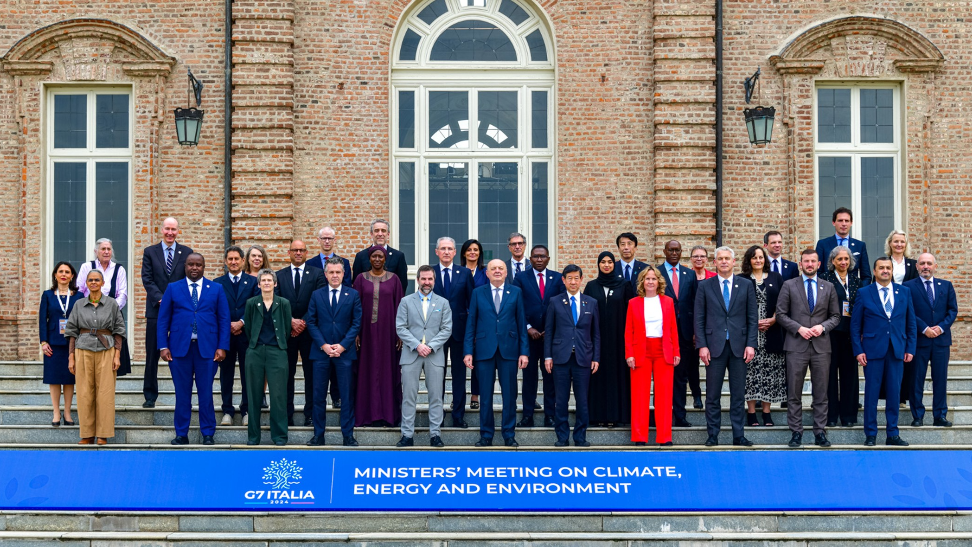G7 leaders tasked the International Renewable Energy Agency (IRENA) to track and monitor the group’s collective contribution toward the global renewable tripling target by 2030. The target was established by the UAE Consensus last November at COP28, aligning global climate ambitions with IRENA’s 1.5°C pathway, mapped out by the Agency’s World Energy Transitions Outlook.
“Trust and transparency go hand in hand,” said IRENA Director-General Francesco La Camera, who is attending the G7 Ministers’ Meeting on Climate, Energy and Environment. “IRENA will respond swiftly to the request by G7 members to track the group’s progress toward the global target to triple renewable power capacity by 2030.”
Citing an IRENA brief for the G7, the communiqué indicates that the group’s solar PV expansion target by 2030 is on track if some enhancements to existing policies are made in a timely manner. It notes the need for further acceleration in offshore wind deployment through enhanced and flexible policy efforts, faster permitting, and offshore grid extension.
“The G7 is making notable strides in accelerating solar PV deployment, and there is commitment to the development of offshore wind. Advancing all forms of renewables, along with infrastructure modernisation, will be essential for G7 nations to realise their energy transition aspirations,” Mr. La Camera added.
The G7 communiqué commits the group to increase system flexibility through grid reinforcement, in line with IRENA analysis of key metrics that suggests efforts need to be accelerated. The group also called for the significant expansion of energy storage capacity, by more than six-fold by 2030, from 230 GW in 2022. This falls within the range of IRENA’s recommendations for energy storage capacity by 2030.
It also calls on international organisations, including IRENA, to continue their work on industrial decarbonisation particularly standards and technology development for hard-to-abate sectors as outlined in a second brief published as a contribution to the G7 discussions.
G7 countries also recognised the urgent need to increase the group’s efforts in developing countries, committing to supporting the Accelerated Partnership for Renewable Energy in Africa (APRA). Under the auspices of APRA, Kenya and IRENA will convene the first APRA Investment Forum in September 2024 to accelerate the deployment of renewables-based energy systems and green industrialisation in APRA Member countries.
In a third IRENA brief, published at the G7 Ministers’ Meeting on Climate, Energy, and Environment, under the request of the Italian G7 Presidency, informs that the flow of public money into the African energy sector continued to decline, and the necessary conditions for low-cost finance are not in place. This must be reversed, according to the brief.
In line with these findings, IRENA recently launched a call for developers working in APRA member countries to submit projects for inclusion at the upcoming APRA Investment Forum for an opportunity to engage with financial institutions, potentially opening funding opportunities.
At the request of the Italian G7 Presidency, IRENA issued key inputs to the G7 Ministers’ Meeting on Climate, Energy and Environment.
Source: IRENA.
Tags: Renewable



Recent Posts
Scandlines Nears Delivery of Zero Emissions Ferry Following Successful Sea Trials
India faces emission roadblocks with rising net-zero demands
Green Energy Resources invests in two electric Liebherr LHM 550
NYK Launches Continuous Use of Bio LNG Fuel on Car Carriers to Advance Decarbonization Goals
Yang Ming Expands Fleet with Methanol and LNG Dual-Fuel Vessels Under Fleet Optimization Plan
ClassNK Advocates Speed Gap Monitoring to Optimize Fuel Efficiency in Heavy Weather
Wärtsilä’s retrofit package for the Corsica Linea ferry Pascal Paoli has resulted in fuel savings of up to 22 percent Corsica Linea
COSCO Shipping Names Second Methanol Dual-Fuel Containership in Yangzhou